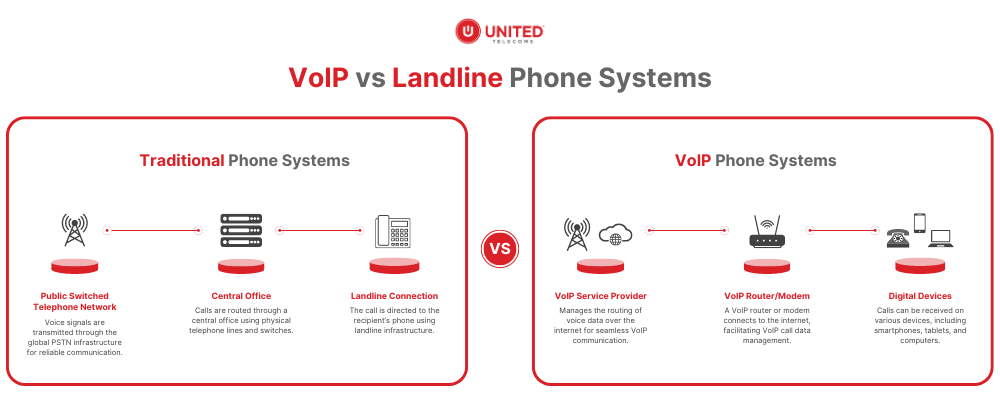Blog
VoIP vs Landline: 8 Key Differences
It’s important to understand the differences between VoIP and landline to make informed decisions, whether for business, small business, or home use. This post will explore eight key differences, presenting them clearly and concisely to help you choose the best communication system for your needs. Join us as we delve into the world of modern telecommunication, comparing VoIP with conventional landline phone systems. We will help you discover the best option for your telecommunications requirements.
Key Takeaways
- VoIP systems offer significant cost savings and advanced features compared to traditional landlines, making them ideal for businesses and homes.
- The flexibility and mobility of VoIP services support modern communication needs, particularly for remote work and dynamic business environments.
- While traditional landlines provide reliable call quality, VoIP’s scalability and lower maintenance make it a future-proof solution for growing businesses.
What is VoIP and How Does It Work?
VoIP (Voice over Internet Protocol) is a technology that allows you to make phone calls through the use of a broadband internet connection rather than a traditional landline connection.
The technology converts voice inputs into digital signals and transmits them over the internet. This process requires a stable internet connection and a VoIP provider to manage call routing and connectivity. Essential equipment includes VoIP phones and adapters, which are different from traditional landline phones that rely on physical telephone lines.
VoIP offers flexibility, advanced features, and scalability, making it a modern alternative to conventional landlines. Understanding how VoIP works will help you choose the right communication system for your business or home needs.
Table of Contents
- What is VoIP and How Does It Work?
- VoIP vs Landline: Identifying the Key Differences
- Final Thoughts on VoIP vs Landline for Business and Home Use
VoIP vs Landline: Identifying the Key Differences
To make an informed decision, you will need to understand the key differences between VoIP vs landline phones. This section has detailed comparisons looking at the main distinctions including costs, call quality, features, and more. Whether you require a phone system for business or home use, knowing these differences will help you choose the best system for your voice communications.

1. Comparing Setup Costs and Ongoing Expenses
When comparing the setup costs and ongoing expenses of VoIP vs landline, VoIP often comes out ahead. The initial setup for VoIP includes the costs of purchasing a VoIP phone system and adapters, which can be offset by the relatively low monthly service fees. In contrast, a traditional landline phone requires more extensive physical infrastructure, which can lead to higher setup and maintenance costs.
Choosing VoIP service typically results in reduced ongoing costs, especially for international calls, due to lower per-minute rates and no need for separate long-distance plans. On the other hand, maintaining a traditional landline phone involves higher ongoing expenses for line rental and additional fees for long-distance phone calls. Over time, these savings can add up, making VoIP a cost-effective choice for many users. However, hidden costs associated with VoIP may include charges for premium features or necessary upgrades to your internet connection to ensure higher call quality.
VoIP savings can be substantial, particularly for businesses or homes with high call volumes. Considering the overall communication expenses, VoIP provides a modern, cost-efficient alternative to a traditional landline phone system, making it an attractive option for those looking to reduce their communication costs.

2. Installation and Setup Requirements
Setting up a VoIP phone system is generally straightforward compared to traditional landline setups. For VoIP, you may need VoIP phones, adapters, and a stable internet connection if you’re choosing a standard VoIP setup (we’ll explore an alternative – virtual landlines – in the Advanced Features and Functionality section).
The installation process often involves plugging the VoIP phone into your router or modem and configuring settings through a web interface. Many VoIP providers offer user-friendly guides and customer support to simplify the setup. In contrast, setting up a landline requires physical telephone lines and jacks, often involving professional installation, which can be time-consuming and costly.

3. Evaluating Call Quality and Reliability
VoIP calls depend on internet speed and stability for higher-quality voice calls. While slower and unstable internet connections can degrade call quality, most modern internet solutions are capable of delivering clear, consistent audio. In addition, solutions like Quality of Service (QoS) settings on routers help to prioritise VoIP traffic, ensuring reliable call quality even in busy network environments.
Landlines, on the other hand, use the Public Switched Telephone Network (PSTN), known for its reliability and consistent call quality. Landlines can be less susceptible to outages and provide clear audio without depending on internet conditions, making them a good option in areas where internet infrastructure is less developed or unreliable.
As internet infrastructure continues to improve globally, VoIP reliability will only increase, making it an excellent choice for businesses and individuals seeking high-quality, feature-rich communication solutions.

4. Advanced Features and Functionality
VoIP services offer a range of advanced features that traditional landlines cannot match. Features such as voicemail to email, call forwarding and video conferencing enhance communication efficiency and flexibility. VoIP systems often include automated attendants, call recording, and integration with other digital tools, making them ideal for modern business needs.
A virtual landline is another powerful feature of VoIP. A virtual landline (sometimes referred to as a VoIP landline) allows businesses to maintain a consistent presence with a single phone number, even if employees are working remotely. This means calls can be forwarded to any device with an internet connection, sometimes through a virtual landline app. This ensures seamless communication regardless of location.
In contrast, traditional landlines offer basic functionality, such as voicemail and caller ID, but lack the advanced communication tools that VoIP provides. This limited functionality can be a drawback for businesses and individuals seeking more robust communication solutions.
The benefits of VoIP services for business phone systems are significant. The ability to manage calls through a unified system, access voicemail remotely, and conduct video meetings seamlessly improves productivity and customer service. For personal use, features like call forwarding ensure you never miss important calls, regardless of your location.

5. Mobility and User Accessibility
VoIP offers significant mobility advantages, enabling users to make and receive calls from anywhere with an internet connection. This flexibility is ideal for remote work, allowing employees to stay connected whether they are at home, in a café, or travelling. Getting a virtual landline number further enhances this flexibility, enabling users to maintain a consistent business presence without being tied to a physical location.
In contrast, traditional landlines are fixed to a specific location, limiting accessibility. This can be a disadvantage for businesses and individuals who need to communicate on the go. The fixed nature of landlines makes them less suitable for remote work and mobile communication needs.
In addition to mobility, VoIP services can significantly improve user accessibility through additional features, particularly for individuals with disabilities. Features like speech-to-text, video calls, and adjustable audio settings make VoIP systems more inclusive and many VoIP companies are continuing to contribute to accessibility standards. These tools allow users with hearing or speech impairments to communicate more effectively, ensuring that VoIP serves a broader range of needs compared to traditional landlines.
Overall, VoIP’s mobility and user accessibility make it a superior choice for modern communication needs, especially for remote work, businesses requiring flexible communication solutions, and users with diverse accessibility requirements.

6. Security and Privacy for Safeguarding Communications
When it comes to security and privacy, VoIP and landline systems have different strengths and vulnerabilities. Traditional landlines are known for their robust security and privacy, as they operate through the Public Switched Telephone Network (PSTN), which is less susceptible to hacking and eavesdropping.
VoIP systems, being internet-based, face potential vulnerabilities such as hacking, malware, and phishing attacks. However, many VoIP providers implement strong security measures to protect users. These include encryption protocols, secure network configurations, and regular security updates to mitigate risks.
To ensure secure communication over VoIP, it is essential to follow best practices such as using strong passwords, updating software regularly, and employing firewalls and antivirus protection. Choose a reputable VoIP provider who prioritises security to significantly reduce the risks associated with internet-based communication.

7. Scalability for Business Growth Potential
VoIP phone systems offer exceptional scalability for businesses, allowing easy addition of lines and features as the company grows. This flexibility makes VoIP ideal for dynamic business environments, where communication needs can change rapidly. Choosing a VoIP service enables you to upgrade your business phone system without significant infrastructure changes, ensuring seamless expansion and making this option a future-proof solution.
Traditional landlines have limited scalability. Adding new lines often requires extensive physical installation and higher costs, making it less adaptable for growing businesses. These limitations can hinder business growth and flexibility, particularly for small businesses looking to expand their operations quickly and efficiently.
VoIP scalability supports business growth by providing a cost-effective, adaptable communication solution that can evolve with your business needs.

8. Maintenance Needs and Customer Support
A VoIP system generally has lower maintenance requirements compared to traditional landlines. Most troubleshooting for VoIP services can be handled remotely, and many providers offer comprehensive customer support, including online resources and 24/7 assistance. This makes resolving issues faster and more convenient.
Traditional landline support often involves physical inspections and repairs, which can be time-consuming and disruptive. While landlines are typically reliable, when problems arise, they can take longer to fix due to the need for on-site service.
Ongoing support and maintenance are crucial for both systems, especially for business users who rely on consistent communication. VoIP providers may offer scalable support packages tailored to business needs, ensuring minimal downtime and optimal performance. Ensuring you have access to reliable customer support can make a significant difference in maintaining smooth operations.

Final Thoughts on VoIP vs Landline for Business and Home Use
In summary, it’s evident that VoIP and landline systems offer unique advantages and challenges.
VoIP phone systems are particularly well-suited to modern dynamic environments for both homes and businesses due to their advanced features, flexibility, and cost savings. Their scalability is also a sought-after feature for businesses looking to grow and expand.
Traditional landlines are known for their reliability and consistent call quality, making them a viable choice for those who prioritise these aspects over advanced functionality. However, their limited scalability and higher ongoing costs can be drawbacks for growing businesses.
The decision between VoIP and landline should be based on a thorough evaluation of your specific communication needs, expected growth, and budget considerations.
Consult with United Telecom’s specialists today to gain deeper insights and find the ideal telephone service tailored to your needs. Explore our range of VoIP phones and services to enhance your home or business communications.







Got questions? Contact our experts today.
We service the following locations across London and the United Kingdom
Greater London: City of London, Hounslow, Barking and Dagenham, Islington, Barnet, Kensington and Chelsea, Bexley, Kingston upon Thames, Brent, Lambeth, Bromley, Lewisham, Camden, Merton Croydon, Newham, Ealing, Redbridge, Enfield, Richmond upon Thames, Greenwich, Southwark, Hackney, Sutton, Hammersmith and Fulham, Tower Hamlets, Haringey, Waltham Forest, Harrow, Wandsworth, Havering, Westminster and Hillingdon.
What Our Customers Say
“Once we approved the installations we were kept up to date daily with the levels of progress on our various sites and were very impressed with the final installation”
Spear Properties
Get In Touch
London Office
2 Osborne Way
Epsom
Surrey
KT19 8GR
United Kingdom (UK)
Tel: 033 1630 0516
Tel: 020 3399 8011
Email: info@united-telecoms.co.uk
We're the experts so that you don't need to be!
PBX Phone System
Beginner's Guide
Voice & Hosted PBX
Resources
PABX Relocation and
Reinstallation
PBX Phone System
Resources